LINZ EUROPE TOUR 2007-2009
What unites Europe?
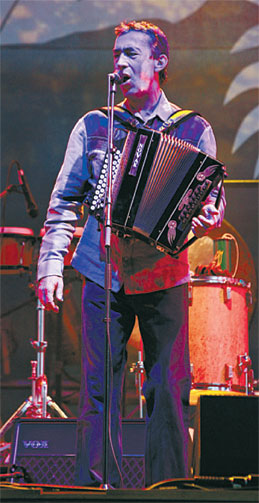 The
Danube meanders along, just above the Neckar. A stylised course of the
Danube is painted on the rump of Hubert von Goisern's stage cargo ship,
it shows all the cities at which the Austrian made a stop in 2007 as
part of his Linz Europe Tour - from
Vukovar in Croatia to Ismail in the Ukrainian Danube delta.
The
Danube meanders along, just above the Neckar. A stylised course of the
Danube is painted on the rump of Hubert von Goisern's stage cargo ship,
it shows all the cities at which the Austrian made a stop in 2007 as
part of his Linz Europe Tour - from
Vukovar in Croatia to Ismail in the Ukrainian Danube delta.
Combined with the softly burbling Neckar and the almost picturesque storage halls either side of the rivers banks of the Stuttgart harbour, there's room for a bit of wanderlust and holiday atmosphere - the paint-sprayed blue of the Black Sea may well turn into the red of a charging bull, easy to assign to a soft drink manufacturer, and call to mind that such an enterprise is unlikely to get off its feet with only subsidies from the budget of the Capital of Culture Linz. But the bull is also closely related in mythology with the formation of Europe and in as much is certainly about symbol-conscious sponsoring.
After a number of concerts cancelled due to flu, Hubert von Goisern came back on stage on Thursday (and Friday) and the sky had compassion too and, after a day of rain, held its floodgates closed for the whole concert. Even the sun broke through the clouds for a moment, though only got the opening Stuttgarter songwriter Philipp Poisel. The 25-year-old turned in a confident half hour set, his soft acoustic ballads staying in one's mind.
Then a quarter of an hour later comes von Goisern. After a quick "hello!" he begins very traditionally on the accordion. The first juchitzer from the audience, then a number of the strong young band board the stage, drummer, bassist and guitarist in kilts banish every element of swaying to the music with cracking beats and riffs. Three enchanting women follow for backing vocals and yodelling, violins and percussion.
The 55-year-old Hubert von Goisern dwells on just the deconstruction of folk music, the pieces, coming mainly from his new album S'Nix present an exuberant mix of rock 'n' roll, polka, funk, reggae, soul and East European folk. The marvellous gadulka player Darinka Tsekova, whom Hubert von Goisern met on the tour in Bulgaria, provides for the latter most of all. It is not just music that the Austrian brought with him from Eastern Europe, but a message too, a plea against stereotypes: "The wild east and the tame west - that's not all right. I know what unites us: fear of each other."
Hubert von Goisern clearly has no fear of boundaries or borders and along with musical frontier crossings in a concert that towards the end became ever more furious a large part of the Stuttgart audience caught sight of a very different new territory this evening: the harbour as a an atmospheric event location.
Artists must come to remind the city of its river. Hubert von Goisern could sing about that too - perhaps at home in Linz in 2009 when he tells of his stops along the way and remembers two evenings in Stuttgart.
Hubert von Goisern conquers Europe with a concert ship
As part of a promotional tour for the Capital of Culture Linz09, the musician is giving 30 concerts from the water in European cities. He recently thrilled the masses in Stuttgart.
Huge scrap metal containers and cargo cranes, bright Linz09 balloons, drab grey clouds: the ambience is more of a rather clichéd reminder of Eastern Europe, which Hubert von Goisern crossed last year on a concert ship, travelling from Lower Austria to the Danube delta at the Black Sea.
Now however the musician is on the Rhine Main Canal, sailing westwards to Rotterdam. Last Friday evening he made a guest appearance in Stuttgart and brought to life "the illusion of a Europe without borders" with a rousing show in front of a crowd of thousands.
"The concept of Europe is important to me," said von Goisern just after the seventh concert on the "west tour". Fear exists in both the east and the west of Europe, fear that the unification of the countries under the EU will be more disadvantageous than advantageous. But the idea of a continent without borders "is too wonderful to not at least try it".
Hubert von Goisern has been travelling since the 26th June with a 77 x 12 metre concert ship, fitted with a hydraulic stage. Since then the nearly 30 member crew has had many obstacles put in their way. While in the "wild south east" they were mainly met with curiosity, in Germany they have been above all dependent on the good will of the numerous officials - something that was not always at hand. The audience in Stuttgart showed their appreciation for the stories of intractable officials and German red tape with a great deal of laughter.
Musically-speaking the evening moved unclassifiably in the area of ethno pop with reggae, soul, folk and jazz influences, the popular accordion only rarely being used. In between excursions in the direction of trip-hop and - very fittingly for Stuttgart - a Janis Joplin cover of Mercedes Benz provided a witty change.
"With these musicians you forget the world", von Goisern paid tribute to his band, who had already shown themselves to be a perfect accompanying combo at the start of the evening with an impromptu appearance with Rolf Stahlhofen, a former member of Söhne Mannheims.
After the east and west tours von Goisern and his crew will have travelled twice for ten weeks, the budget of about four million Euros is coming mainly from main sponsor Red Bull and the Capital of Culture Linz09.
By the end of August von Goisern will have completed about 30 concerts on his second Linz09 tour. The crowning finale will be in July 2009 with a harbour festival lasting a few days, at which all the artists who have taken part in the concerts will appear.
The existential risk for a mountain singer on the river
Hubert von Goisern has had to cancel four concerts
on his Linz Europe Tour due to a bad summer flu.
Tomorrow the singer will resume the river tour in Stuttgart Harbour.
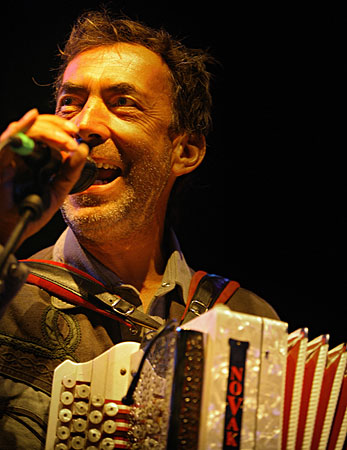 Two
of Hubert von Goisern's currently have a lot on their plates: Martin
Heller, manager of Capital of Culture Linz 2009, comes under constant
fire for his ambitious programme in Linz.
"A large proportion of the budget goes to Linz and the surrounding
area," says Heller, "I'm not letting Anna Netrebko climb the
Plague Column in Vienna." But he has done something very courageous:
He has invested a million Euros of his Capital of Culture budget in Hubert
von Goisern's Linz Europe Tour. The ingenious
reinventor of folk music from Bad Goisern in the Salzkammergut sailed
the Danube last year through Eastern Europe with a 77 metre long concert
cum barracks ship. There he met musicians, whom nobody here knows, staging
memorable concert meetings at more or less rotten river banks. In Vylkove
at the Ukrainian Danube delta he caressed his song Solide
Alm so intimately that a member of the audience jumped into the
river, which isn't especially clean down there.
Two
of Hubert von Goisern's currently have a lot on their plates: Martin
Heller, manager of Capital of Culture Linz 2009, comes under constant
fire for his ambitious programme in Linz.
"A large proportion of the budget goes to Linz and the surrounding
area," says Heller, "I'm not letting Anna Netrebko climb the
Plague Column in Vienna." But he has done something very courageous:
He has invested a million Euros of his Capital of Culture budget in Hubert
von Goisern's Linz Europe Tour. The ingenious
reinventor of folk music from Bad Goisern in the Salzkammergut sailed
the Danube last year through Eastern Europe with a 77 metre long concert
cum barracks ship. There he met musicians, whom nobody here knows, staging
memorable concert meetings at more or less rotten river banks. In Vylkove
at the Ukrainian Danube delta he caressed his song Solide
Alm so intimately that a member of the audience jumped into the
river, which isn't especially clean down there.
This year the west tour is taking place - along German rivers to Holland, and next summer, as finale and high point, there will be a world music festival with Hubert von Goisern and his musical guests in Linz. "We are using this tour to tell people about Linz 09, using a boat", says Martin Heller, the Capital of Culture manager with a lot on his plate at the moment.
The musician under pressure
Trouble is something that - somehow - Germany's only real soul star Xavier Naidoo has too. It is rumoured that his management want him to give more of his own concerts. But at the moment Naidoo is spending nearly every spare minute on Hubert von Goisern's ship. In Mainz, a good week ago, The Mannheimer stood in for the Austrian, yodelled and played Goisern numbers with the Goisern band. Those who were there say that it was very touching.
The memorable cover concert in Mainz was necessary because on those days it was Hubert von Goisern who had the most trouble on his plate. Eastern Europe was expensive. And the singer and accordion player, who was musically inspired once by Africa, by Tibet, but time and again mainly by his homeland in the Salzkammergut is under pressure: "If I don't bring in a seven figure amount - perhaps because of engine damage, or because the weather thwarts our plans - then we'll be paying out of our own pocket," he said shortly before the start of his west tour. "The risk is great, the existential risk too."
But it was neither engines nor the weather that incapacitated the musician. It was his body. After concert in Nuremberg on 2nd July with Konstantin Wecker he had to retire to his cabin with a fever, on 4th July he left the ship at Würzburg lock and was taken to the casualty department. The hospital in Würzburg kept him in. On 5th July his manager drove him to Offenbach in the evening for the concert. The doctors had allowed an hour, Hubert von Goisern played almost two.
The midges need a victim
Then hospital again, this time in Frankfurt, hideous blood work and an advanced summer flu with poor lungs. Hubert von Goisern, now 55, had to cancel concerts for the first time in his life, one in Mainz, two in Ulm, one in Karlsruhe. But tomorrow he'll be returning to his ship's stage in Stuttgart Harbour. He really wants to.
Because Hubert von Goisern has a wonderful cargo on board. S'Nix, his eleventh studio album, released in May, is his best yet and the most daring jump forward since he recorded Alpine Lawine twenty years ago, changing folk music. S'Nix is a passionate hunger for life set to crackling guitar and drum storms, furious violin madness, labyrinths of bass, keyboard, accordion and yodelling, in which you can get pleasurably lost. S'Nix is complicated and yet exhilaratingly catchy. "I don't want to sing, I want to shout", Hubert von Goisern avows in the song Herschauen, but in the disarming love song Die Liab he then bows his thanks to life with touching tenderness. The full, unrestrained, boundless musicality of Hubert von Goisern on S'Nix is a distillation of the Danube recorded with the tour band, that makes it impossible for you to proceed to the order of the day. Instead you begin to search for life in your own existence.
Hubert von Goisern knows that he has made something very new with S'Nix. "I don't know whether half my audience will say: 'I'm not going along with that, it's too strange for me'", he said before the tour began. He also knows that with every step ones takes, one leaves a trace and treads on something. He can live with it now: You start sweating and then the midges come along and swarm around you and bite you. But they need a victim, something they can suck on and live from. " And he learned something on the Danube in Eastern Europe: "Dialogue means that the other person has something to say too, and doesn't assumed that he says the things I want to hear."
In the booklet of his new CD Hubert von Goisern thanked Xavier Naidoo, who sang with him on the dreamy, life-affirming song Siagst as. "We'll meet on the way!" he wrote to his new friend. And Martin Heller, the Linz 09 manager, is for him a "person of integrity".
Martin Heller suffered along in the Ukraine, "where Hubert couldn't use his language any more". Xavier Naidoo doesn't want to leave the ship. And Hubert von Goisern meanwhile knows what bewildered most other people the most: "We went to Eastern Europe to take something to them, not to make money." He knows how it feels to be misunderstood. But on his record S'Nix Hubert von Goisern has very prudently overcome the category of annoyance with playful lightness and resounding heaviness. He plays music as vehemently as if against traffic noise. Or as gently as among the reeds. He now takes it as it comes.
Hubert von Goisern will be playing tomorrow and Friday at 19.30 hrs in Stuttgart Harbour (Am Mittelkai 16). Guests: Philipp Poisel (tomorrow), Rolf Stahlhofen (Friday).
Alpine showtime: Hubert von Goisern wows in Offenbach
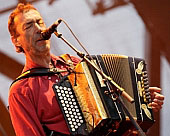 In
the usual concert business, it is customary to visit as many cities as
possible to avert financial losses. The "alpine rocker"
Hubert von Goisern declined this trend some time ago. He has prescribed
himself the discovery of slowness. After visits in the east, it's now
time to go in the other direction. The finale is in Rotterdam.
In
the usual concert business, it is customary to visit as many cities as
possible to avert financial losses. The "alpine rocker"
Hubert von Goisern declined this trend some time ago. He has prescribed
himself the discovery of slowness. After visits in the east, it's now
time to go in the other direction. The finale is in Rotterdam.
At the halfway point so to speak he stopped on the shores of Offenbach and played an inspiring concert on the Main bank on his own converted floating barge, with a whole gang of musicians, family members and staff on board. Aside from familiar Goisern numbers and the sparkler-waving ballad Weit weit weg the current CD S'Nix stood at the heart of the evening.
Xavier Naidoo was also a guest on the album and according to the tradition of a guest musician always joining the Linz Europe Tour, he went on board in Offenbach. The result is an interesting ballad collaboration Siagst As. The record and concert both account for a broad spectrum, but remain a completely rounded piece of work - further proof of Goisern's class.
"Europe is unique!"
Hubert von Goisern, born Hubert Achleitner, is not someone you can pigeonhole. His eventful life, his travels abroad and his work as a singer and actor speak a bold language.
How did this idea come about of going on a river concert trip on ships through Europe?
The idea of putting together a floating festival to bring people together arose about 10 or 11 years ago in Africa at Lake Tanganyika. I didn't and don't want to do it in Africa myself, but rather find a integrative figure, an artist from the region who could do it. There are such people there, but I haven't found one yet. As a foreigner I am not the one to do it, I just have the idea. As for Europe, the idea came to me on the Danube. There's a need for action to bring people together here too, to bring down mistrust and prejudices between EU citizens, especially in regard to the east and the eastward expansion.
On 5th July you will be appearing together with Xavier Naidoo in Offenbach. On your current CD S'Nix is a song that you wrote together with him. How did you meet and what appealed to you in the collaboration?
I met Xavier Naidoo years ago in Upper Austria at Burg Clam and asked him quite spontaneously whether he would like to do something with me. I liked the way he communed with his audience and the atmosphere he created. When my Europe tour was slowly taking shape I asked him again and he said yes immediately. As far as the song on my CD is concerned, I have to admit that due to time constraints we weren't together in the studio. He did a part and sent it to me and I did my part. We sent the recordings back and forth to each other until it was done.
On your tour you appear with a variety of different artists. According to which criteria did you choose them?
Simply according to my own personal inclination, feeling and situation.
Is there an artist who gave you the brush-off?
Yes, but I'm not giving you a name! (laughs) I just hope that they're feeling pretty annoyed now!
You have travelled a great deal and a long way in your life, living abroad for several years. What is the attraction for you in your Europe tour?
Well Germany is still a foreign country (laughs). I like being here a lot and feel happy here, but it's not home for me. I would have to live here for a while - which I could well imagine doing. Europe is unique, it offers a great variety in a small space. The "European experiment", if you want to call it that, is something I find exciting. And I can play well here.
Your music was used without permission at an Austrian political rally. You fought against this misuse. When you sing in German/Austrian, do you automatically come under suspicion of having nationalist leanings, or being close to certain parties?
No, that seems to be a kind of thought reflex for only a few people. Of course you can sing in the German language. It's more extreme with tradition, which is often equated with nationalism. But this equation is wrong and something that I fight against.
Your engagement for minorities has been a constant theme in your life. Where does this interest come from?
I think it should be a healthy reflex for everybody. When you see weakness and need and you are yourself strong, you shouldn't look away, you should help.
You left South Africa after a few years out of disappointment at the apartheid. Apartheid has been history for some time now. Would a return be a possibility for you?
No, because back then I was independent. Now I have my family here and my place of activity is here. South Africa is too far away from that and I have no desire to live there.
You are very interested and involved in Tibet. How did your contact with the Dalai Lama come about?
Contact came about through an exiled Tibetan lady. In the course of working with her I came into the subject more and more. At some point I wanted to travel in the country myself and not just get information second hand. I wanted to see with my own eyes what the conditions there were like. I met the Dalai Lama before this journey and have also done so from time to time since. What I found in Tibet is sad. There is a complete lack of freedom. It's how I imagine life in former East Germany, or under National Socialism. You have neither freedom of opinion, nor movement.
An example?
Tibet consists of lots of districts and Tibetans can't go from one district to the next. There is an atmosphere of oppression and gloom. It is a barren country, with warm, friendly people, who laugh a lot if you can get them out and take their minds off this situation for a while.
What would, in your opinion, be a solution to the conflict with China?
I disagree with the Dalai Lama, who says that Tibet should belong to China and that China should simply allow the Tibetans more freedom. The solution for me can only be that China withdraws from Tibet and the two countries are separated from each other again. Tibet has its own writing and culture, which is very difficult from the Chinese. I also think it's a shame that this issue puts the Chinese in a bad light as a people. It is in China's own interest that they find a solution for this issue.
Do you believe that musicians, or artists in general, should be politically engaged and utilise their popularity?
You have to eat, right? But just because everyone has to eat, it doesn't mean that everyone can cook, even if that would be better and healthier. Basically I think it's right that there is a certain group of people who look after the communal life and all the concerns of the people, that group being the politicians. As an ordinary person you should take an interest in politics, but you don't have to.
In his element
Alpine rocker Hubert von Goisern is on a concert
tour by ship
- an interview about the art of destruction and the attraction of failure
You're on tour on a ship. What do the nautical personnel on board think of you, the alpine musician?
It's like a cross-fertilisation. I think the nautical personnel on board - two captains, two sailors, an engineer - have an extended vocabulary now too. One of instruments. The gadulka for example, none of them knew it previously. Then Darinka Tsekova, who plays the instrument, came on board with us for a few weeks. Soon everybody knew that she played the gadulka - and not some unusual thing.
How has your ship tour gone so far?
The first half was sometimes tense as far as organisation was concerned. The adventure factor was pretty high. You can't underestimate nature. Since last we've been moving on the ship in the open air almost without a break. Of course you have your bunk on board. But it's so small that you only really stay there to sleep. Otherwise you're outside under the sky. When the weather conditions are adverse you sometimes have more of an adventure than you were looking for.
You were saved any "Titanic" moments, though?
We had two, three bad storms. We came out of one them with two black eyes. We had gusts of wind at 120kmph and that was with the stage up on the water: it's twelve metres high and thus provides a huge target. We had hail, the ship looked as though it had been snowing, it ripped everything to shreds. Anyone who works with computers knows the horror when water runs into the top and out of the bottom. That happened to us an hour before the first concert.
Do you feel an attraction to such extreme situations?
Hm, I think I make a conscious effort to get into situations where I'm aware of failure - or rather: the possibility of failure. The way I go through life and realise the possibility of death. In order to handle in the best way possible this gift we've been given: to live in this world, which I think is for the most part beautiful and exciting. The possibility of failure is always there.
Where does the fascination lie for you in pioneer projects like this?
The basic idea for me is meeting, getting to know each other. I think that always works best when you do something together. Not just opening a bottle together - but: setting your hand to something. Making music together for example. You learn to hold yourself back and make room for the other person. On the other hand you must also have the courage to get involved. Neither are so simple. When you have a piece and you think it's perfect, and someone comes along - and suddenly you have to leave something out. The other way around: when you come to someone who has a completely round, beautiful work. To sing something or play an instrument to it - at that moment it's clear that I'm ruining it. Something new develops. But first of all I have to destroy something: I cut into his piece, it starts to shake, then it starts up again - and something new comes from it. That takes courage.
Is this precision engineering something that only comes clear to you with age?
In my case it was something akin to my original intention: at least to destroy folk music. I wanted to make it my own personal folk music, not leave it to those who live where I live too and who accordingly claim it for themselves. After all, I live there too, it's my music too! So I wanted to get into, blow it apart and see what happens when you put the pieces back together again a different way.
The relaxed nature of a thoroughbred European
Hubert von Goisern and Xavier Naidoo at Offenbach harbour
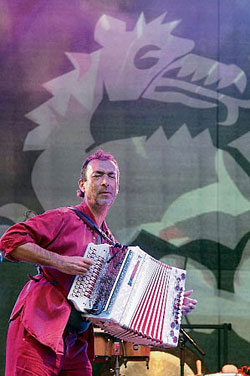 "Hubert,
Hubert" the fans called, as the wonderful concert evening in the
open air on the banks of the Main in Offenbach came to an end. Half an
hour before Xavier Naidoo had let his host Hubert von Goisern go for
a "drink break" until the final goodbye, people expected. But
that didn't come off. Goisern remained behind the scenes, without saying
goodbye to his audience*. His concert partner said something about a
forthcoming storm and said: "We're thinking of your safety".
Shortly afterwards helpers began to clear the instruments from the stage.
But neither disappointment nor annoyance could spread. The three hours
that had gone before had been much too beautiful and, above all, much
too relaxed.
"Hubert,
Hubert" the fans called, as the wonderful concert evening in the
open air on the banks of the Main in Offenbach came to an end. Half an
hour before Xavier Naidoo had let his host Hubert von Goisern go for
a "drink break" until the final goodbye, people expected. But
that didn't come off. Goisern remained behind the scenes, without saying
goodbye to his audience*. His concert partner said something about a
forthcoming storm and said: "We're thinking of your safety".
Shortly afterwards helpers began to clear the instruments from the stage.
But neither disappointment nor annoyance could spread. The three hours
that had gone before had been much too beautiful and, above all, much
too relaxed.
Ship guest Xavier Naidoo opened the evening promptly with Ich kenne nichts (I know nothing) and instead of singing "as beautiful as you", he sang "as beautiful as Offenbach here on the bank" in the last chorus. And he was right. The conditions couldn't have been better: temperature, atmosphere, mood and sound - it was all right. At the start Naidoo presented his own pieces and pieces from Söhne Mannheims on the cargo ship "Brandner IV", which has been converted to a concert stage. Again and again he praised Hubert von Goisern's band, who had learned his songs "overnight". Darinka Tsekova provided intense moment on the gadulka, an exceedingly concise Bulgarian stringed instrument.
After a short break Hubert von Goisern was received with great cheers. Spectators streamed from the grandstand to the stage. "Hello," he said briefly into the microphone, before he started an accordion-heavy, driving instrumental piece. The singer - aside from the accordion, he also played trumpet and guitar and yodelled - presented himself in a fluttering red shirt over red trousers. As if he wanted to signal a relaxed nature, which means so much to him in relation to a united Europe.
Mainly pieces from the new album S'Nix were to be heard at the mooring point on the Main, such as Regen carried by chill-out rhythms, Weltuntergang, changing between folk festival and disco, and the gentle ballad Die Liab.
The Upper Austrian with a penchant for experimentation writes music that comes across in widescreen format and goes in deep. Complex sound pictures from time to time, which open up mountain panoramas of fantasy, though there isn't a mountain in sight.
The man born in Bad Goisern played the elegiac Heast as net and Weit weit weg from the Alpinkatzen days. The audience joined in without invitation. He did without Hiatamadl, the song that brought him a breakthrough in 1992, preferring a dialect interpretation of Janis Joplin's Mercedes Benz.
Xavier Naidoo took to the stage once more for the co-produced Siagst as, staying for another half hour to end the evening with an improvised "Offenbach jam".
* HvG editor's note: Hubert von Goisern unfortunately had to cut short his show due to illness
Cargo ship concert from Naidoo and von Goisern
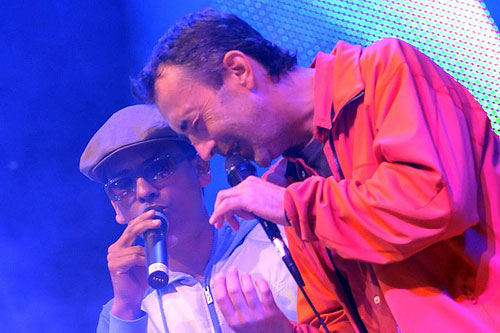
A successful pop concert in an unusual place: musicians Hubert von Goisern (55) and Xavier Naidoo (36) played on a cargo ship in Offenbach on Saturday evening. Several thousand spectators cheered them on from the river bank.
The Austrian von Goisern has been travelling with a ship on European waterways since last year. Each time he invites different artists to join him for concerts. The car-mad Naidoo seemed delighted with the peaceful atmosphere on the ship. The soul singer said that from his hometown of Mannheim he could even set off along two rivers.
